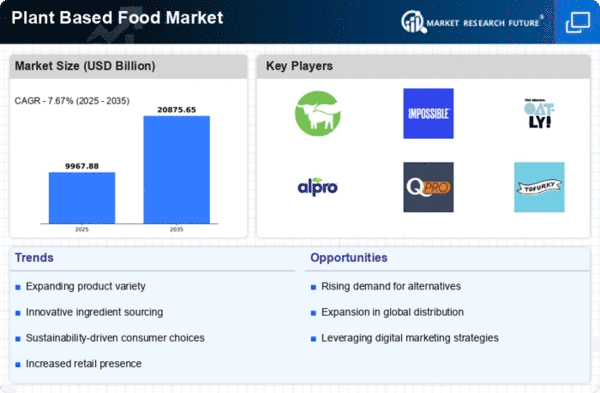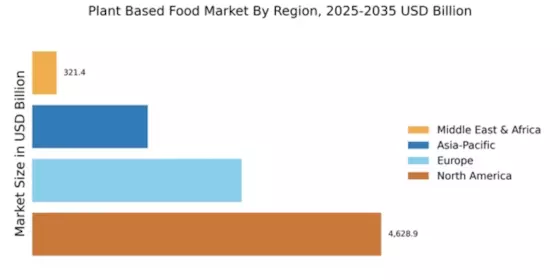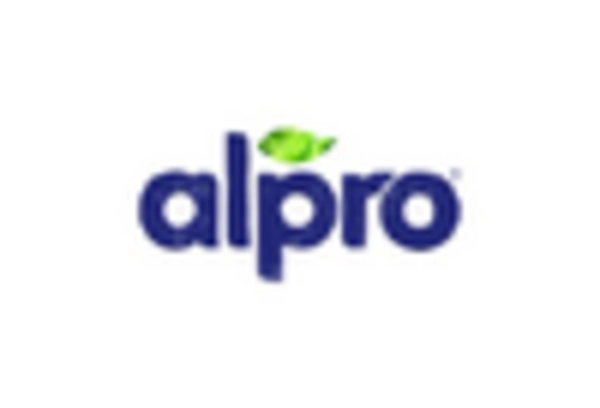Market Growth Projections
The Global Plant-Based Food Industry is poised for substantial growth, with projections indicating a market value of 30 USD Billion by 2035. This anticipated growth reflects a broader trend towards plant-based diets, driven by health, environmental, and ethical considerations. The industry is expected to experience a compound annual growth rate of 11.18% from 2025 to 2035, highlighting the increasing consumer demand for plant-based products. As more individuals adopt these diets, the market is likely to evolve, presenting opportunities for innovation and expansion across various segments.
Rising Health Consciousness
The Global Plant-Based Food Industry experiences a notable surge in demand driven by increasing health consciousness among consumers. Individuals are becoming more aware of the health benefits associated with plant-based diets, such as reduced risks of chronic diseases and improved overall well-being. This trend is reflected in the projected market value of 9.35 USD Billion in 2024, as consumers seek alternatives to traditional animal-based products. The shift towards healthier eating habits is likely to continue, as more people recognize the nutritional advantages of plant-based foods, thereby contributing to the industry's growth.
Environmental Sustainability
Concerns regarding environmental sustainability play a pivotal role in the expansion of the Global Plant-Based Food Industry. As awareness of climate change and its impacts grows, consumers are increasingly opting for plant-based options that are perceived as more environmentally friendly compared to meat production. The industry is projected to reach a value of 30 USD Billion by 2035, indicating a significant shift towards sustainable food sources. This transition is not only beneficial for the planet but also aligns with the values of a growing segment of consumers who prioritize eco-conscious choices in their dietary habits.
Changing Consumer Preferences
Shifts in consumer preferences significantly influence the Global Plant-Based Food Industry. Younger generations, in particular, are more inclined to adopt plant-based diets due to ethical considerations, health benefits, and environmental concerns. This demographic shift is reshaping the food landscape, as consumers increasingly seek transparency and sustainability in their food choices. The growing popularity of plant-based diets among millennials and Gen Z is likely to sustain the industry's momentum, as these consumers prioritize brands that align with their values and lifestyle choices.
Innovative Product Development
Innovation within the Global Plant-Based Food Industry is a critical driver of growth. Companies are continuously developing new and diverse plant-based products that cater to various consumer preferences, including meat alternatives, dairy substitutes, and snacks. This innovation is evidenced by the introduction of products that mimic the taste and texture of traditional animal-based foods, appealing to both vegans and flexitarians. As a result, the market is expected to grow at a compound annual growth rate of 11.18% from 2025 to 2035, showcasing the potential for ongoing product diversification and consumer engagement.
Increased Availability and Accessibility
The Global Plant-Based Food Industry benefits from enhanced availability and accessibility of plant-based products. Retailers and food service establishments are increasingly incorporating plant-based options into their offerings, making it easier for consumers to access these products. This trend is supported by the growing presence of plant-based brands in supermarkets and online platforms, which cater to the rising demand. As the market continues to expand, the convenience of purchasing plant-based foods is likely to attract a broader consumer base, further driving industry growth and reinforcing the shift towards plant-based diets.

















